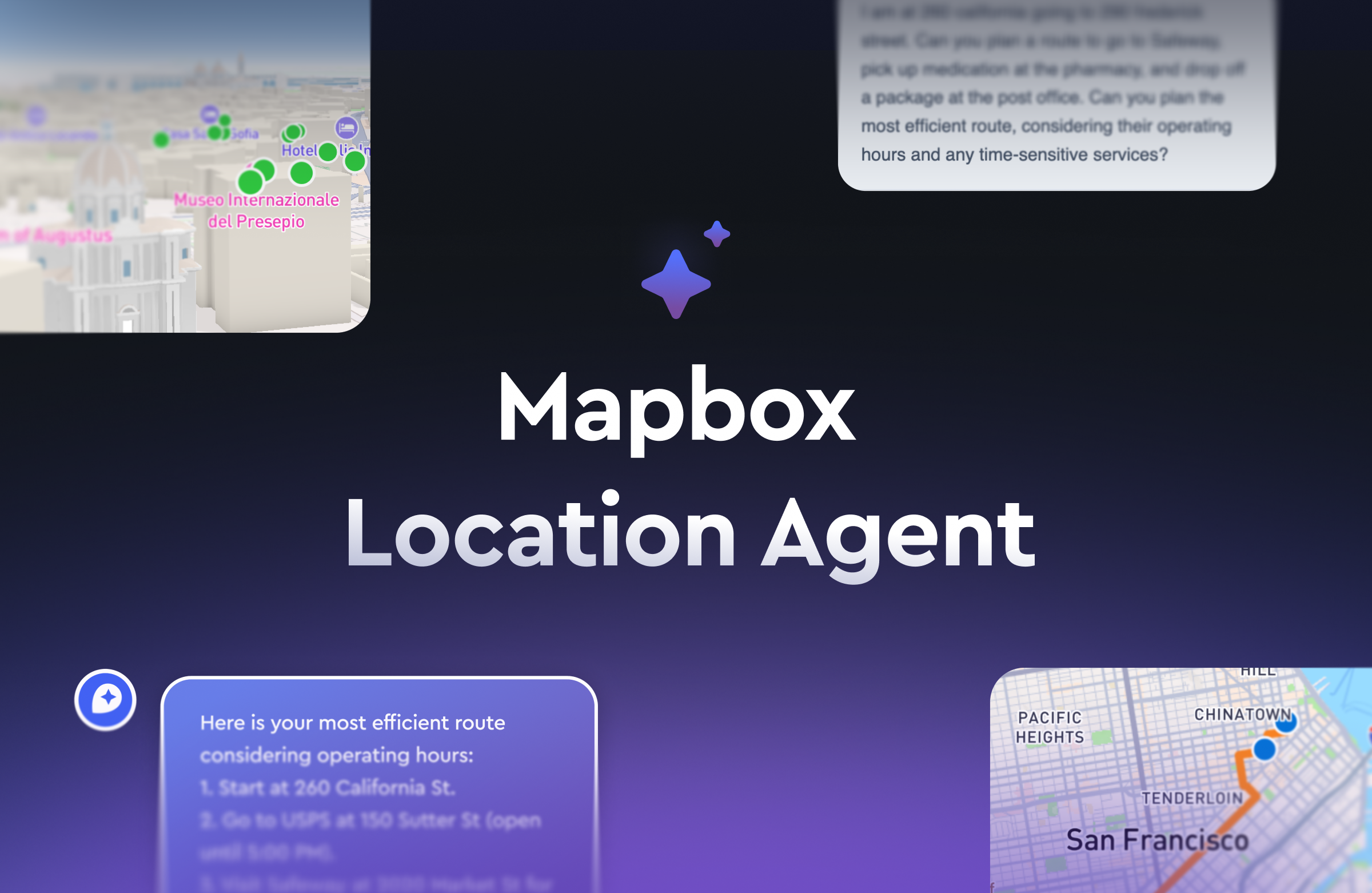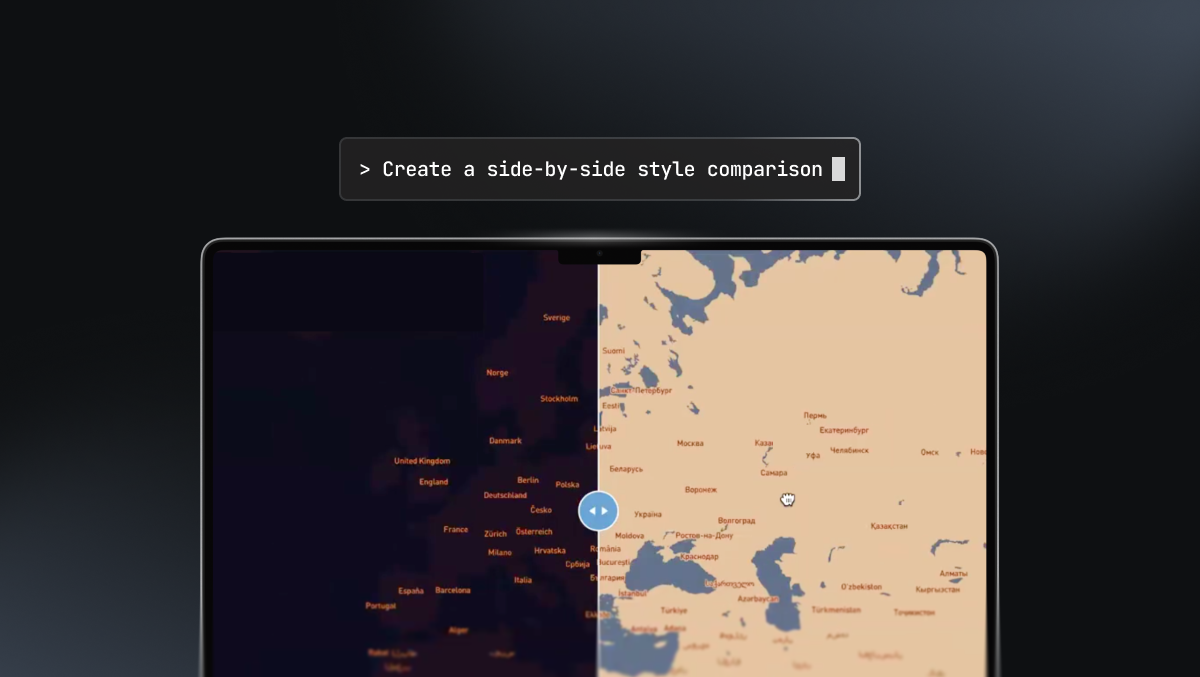Introducing the Mapbox Model Context Protocol (MCP) Server
Heading
Lorem ipsum dolor sit amet, consectetur adipiscing elit, sed do eiusmod tempor incididunt ut labore et dolore magna aliqua.
Equip LLMs and AI agents with geospatial expertise
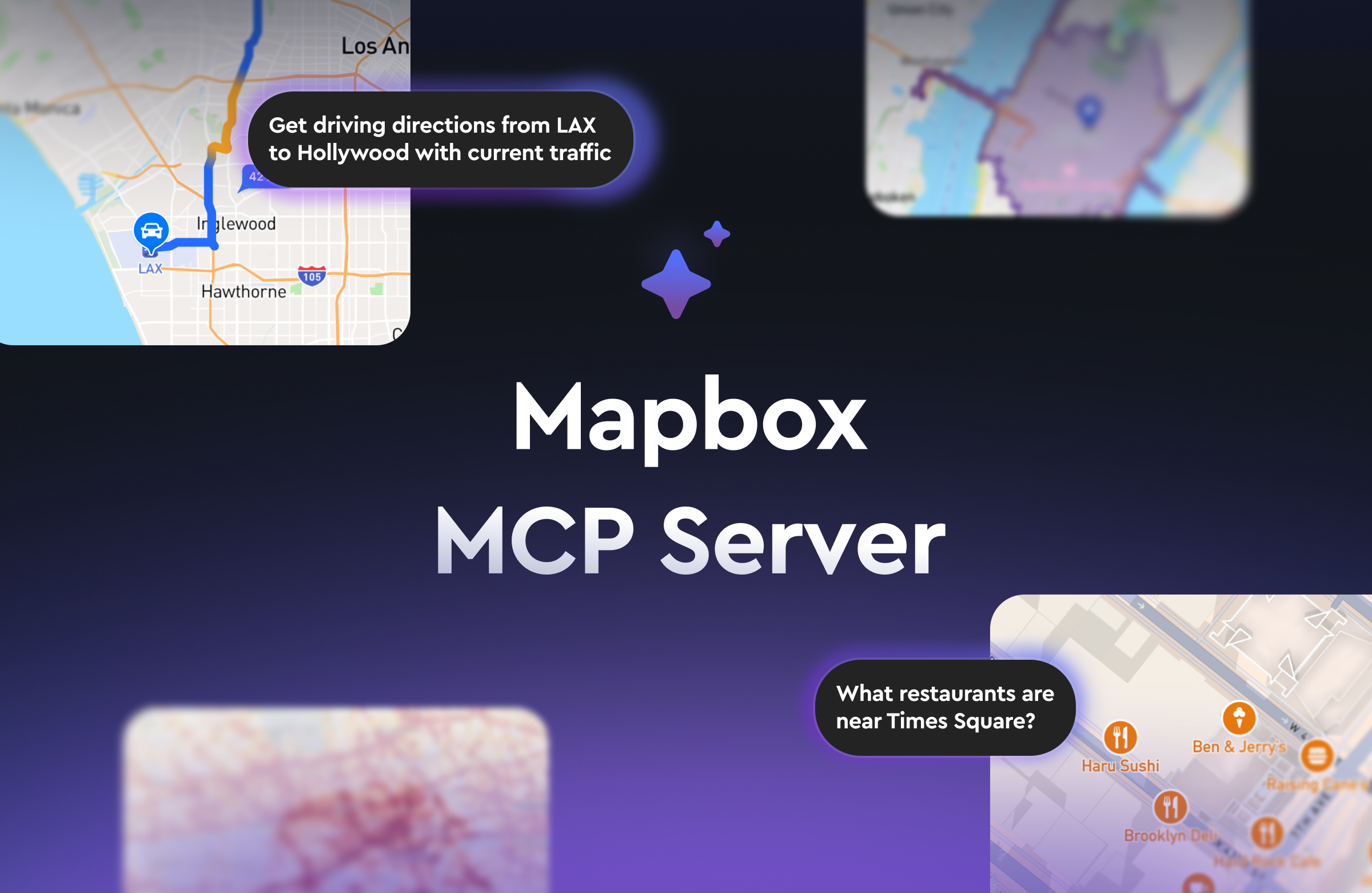
In the rapidly evolving world of artificial intelligence, a new kind of customer has emerged: the agent. AI agents are converting vast amounts of data into recommendations and actions, but their inability to include spatial reasoning in their synthesis is a critical blind spot.
For developers building AI agents, assistants, and applications that interact with the physical world, this gap matters. The Mapbox Model Context Protocol (MCP) Server provides AI agents and Large Language Models (LLMs) structured access to the full Mapbox location platform — equipping them with the spatial awareness and geospatial skills to deliver accurate, context-aware answers when geography is relevant.
Artificial intelligence needs location intelligence
LLMs are excellent at language, but they have taken zero geography lessons. Most AI systems lack an understanding of spatial concepts that humans naturally account for, like proximity or direction. Humans think geographically without even realizing it — whether planning errands, giving directions, or deciding where to eat. When an AI system fails to account for basic spatial context like suggesting three “nearby” restaurants that are actually in opposite directions, the experience feels broken, or even misleading. The user is left to do the heavy lifting: cross-referencing distances, checking traffic, and stitching together disjointed results into the actual answer.
Let’s consider a common user request: “What is the best route home that avoids traffic and passes a pharmacy?”
Today, even advanced AI assistants often struggle, returning incomplete, outdated or generic suggestions that miss vital nuance of place, purpose, and timing. A typical response might list pharmacies near your home, and separately suggest a route, leaving you to figure out which pharmacy is on the way, or whether any are open, or how traffic conditions might shift the route.
Now, imagine an AI agent built by a developer using the Mapbox MCP server. Equipped with geospatial intelligence, the agent can understand the user’s intent. It recognizes the need for a route, the desire to avoid traffic, and the requirement to stop at a specific type of place (a pharmacy). Using the MCP server, the agent can:
- Geocode the user’s home and current location.
- Use Mapbox Directions API to calculate the optimal route home, taking into account current or expected traffic.
- Use POI Search to find pharmacies along or near the suggested route that will be open by the time the user gets there.
- Use the Matrix API to analyze options and find the pharmacy that adds the least amount of time to the journey.
The agent then presents the user with a single, elegant solution: a map showing the best route home, with the detour to the most convenient pharmacy already included, along with an updated, accurate ETA. With Mapbox MCP, the agent is not only answering questions, it is geospatially fluent and capable of solving real-world tasks with spatial reasoning.
Mapbox MCP Server: The geospatial toolkit for AIs
The Mapbox MCP Server transforms any AI agent or application into a geospatially-aware system by providing access to the Mapbox location platform. An agent or LLM equipped with the Mapbox MCP Server can invoke geospatial tools and data in order to respond to questions in a way that reflects the user’s intent, surroundings and real-world conditions.
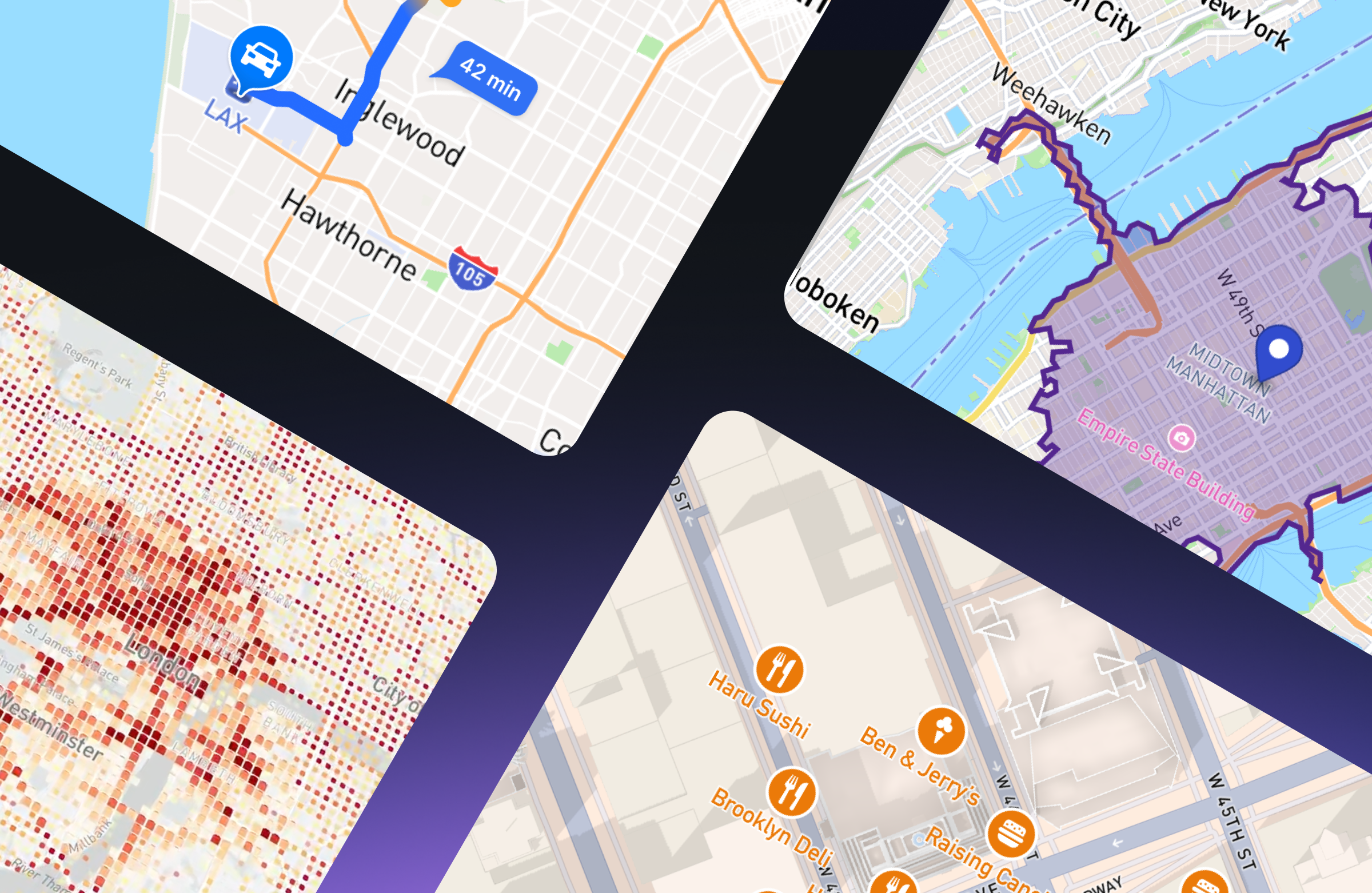
With the Mapbox MCP server, an AI can understand and reason about places, create maps to provide a visual explanation, and access rich geospatial data including millions of businesses, landmarks, and places worldwide. An AI can use Mapbox geocoding to convert addresses or place names in a user’s query into geographic coordinates that can be used to analyze proximity or plan a route.
Using Mapbox Navigation APIs, an AI can calculate directions for driving, walking, or cycling while accounting for current or typical traffic conditions. By tapping into the Mapbox Matrix or Isochrone APIs, an AI can run travel time scenarios to analyze accessibility, optimize logistics, and visualize areas reachable within specific time or distance constraints.
Flexible access to Mapbox services supports an open-ended range of use cases for any application or agent that benefits from spatial awareness, from planning travel routes, to optimizing logistics, to supporting urban planning. A geospatially-equipped AI can handle complex tasks like avoiding low-clearance bridges, identifying underserved communities, or suggesting optimal locations to open a business.
How the Mapbox MCP Server works
The Mapbox MCP Server is an interface specifically designed for AI systems. Instead of requiring developers to integrate each individual Mapbox API, the MCP Server simplifies the process by exposing a suite of geospatial capabilities that AI systems can call directly. These tools allow AI agents to interpret human intent and automatically orchestrate the appropriate sequence of actions, such as geocoding a location, performing POI searches, analyzing traffic, or generating route directions, without manual endpoint-by-endpoint integration.
.png)
With the Mapbox MCP Server, an agent can decide when and how to access Mapbox services to enhance its general reasoning abilities. For instance, if a user asks, “I am moving to Seattle, what neighborhoods should I consider if I want to be near parks and walking distance from restaurants but also close to the highway for a daily commute to Redmond” the agent might use Mapbox geocoding to locate Seattle and Redmond, the Mapbox Tilequery API to identify roads classified as highway, a POI category search to identify clusters of restaurants and parks, the Isochrone API to identify residential areas within a reasonable walking distance of the restaurant clusters and parks, the Mapbox Directions API to calculate potential commuting routes, and then synthesize those together to highlight recommended areas visually on a map.
Developers building an AI-powered service, such as a travel assistant, logistics optimizer, or location-based recommender, can integrate the Mapbox MCP Server by self-hosting it within their infrastructure and registering the available tools with their application. It is also possible to enable access to the Mapbox MCP Server on popular clients like Claude Desktop.
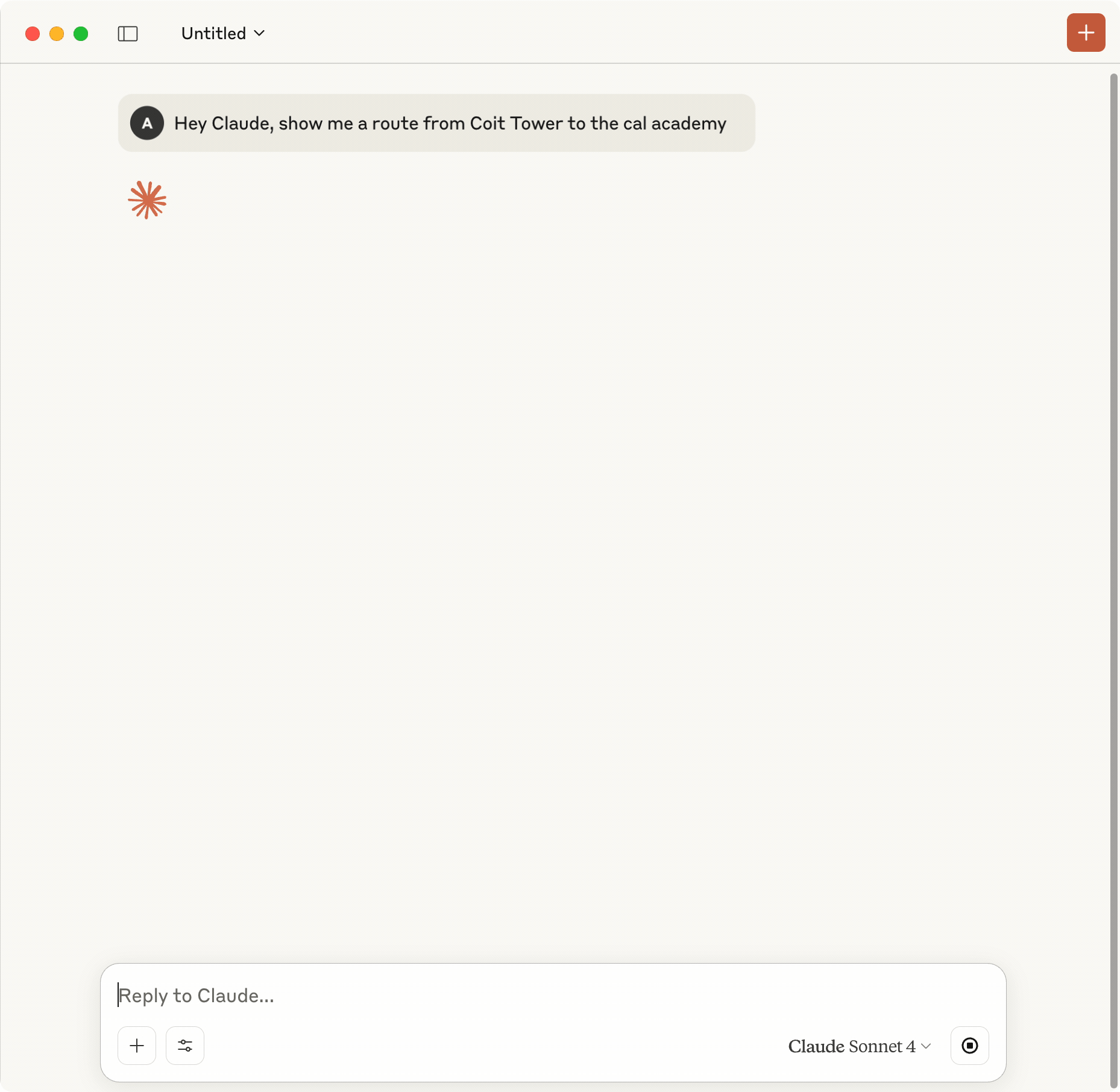
Get started with the Mapbox MCP Server
The Mapbox MCP Server is available today and only requires a Mapbox account access token in order to begin making Mapbox API calls. Development of the Mapbox MCP Server is actively ongoing and adapting to requests, feedback, and potential use cases. Connect with us to discuss building with the Mapbox MCP Server.
Lorem ipsum dolor sit amet, consectetur adipiscing elit, sed do eiusmod tempor incididunt ut labore et dolore magna aliqua.



